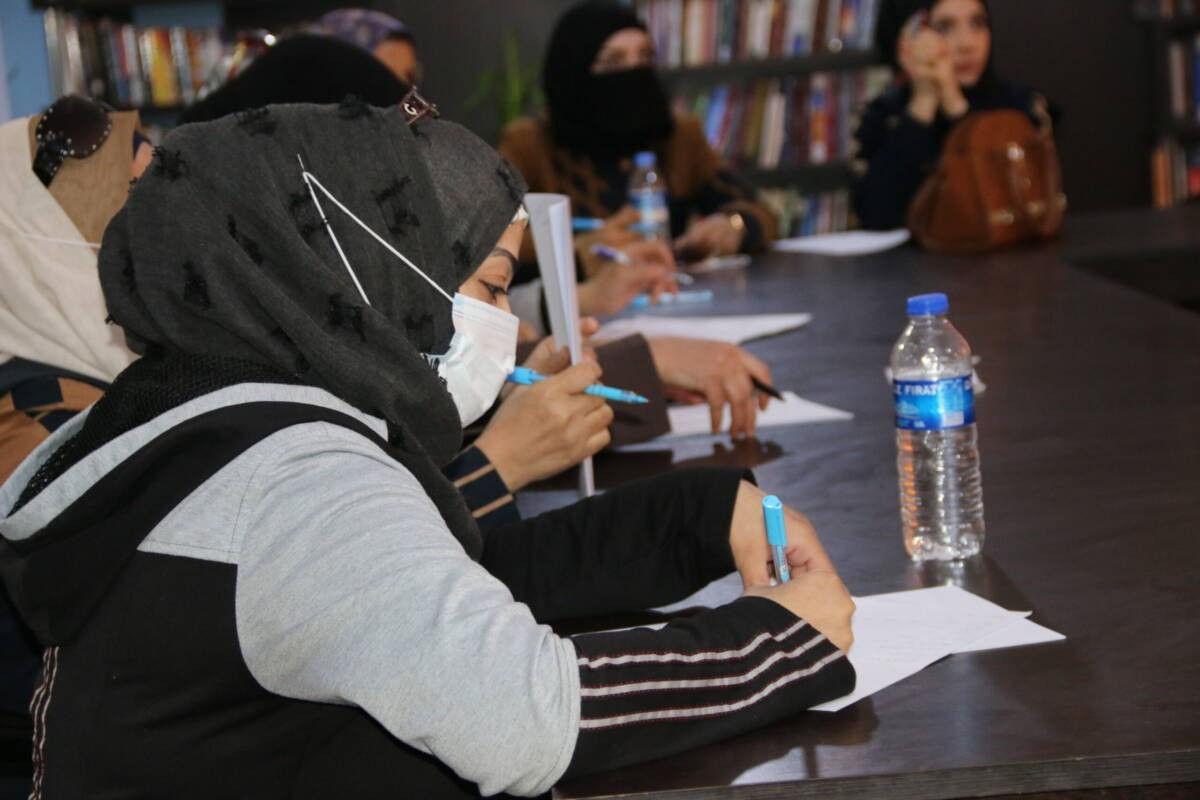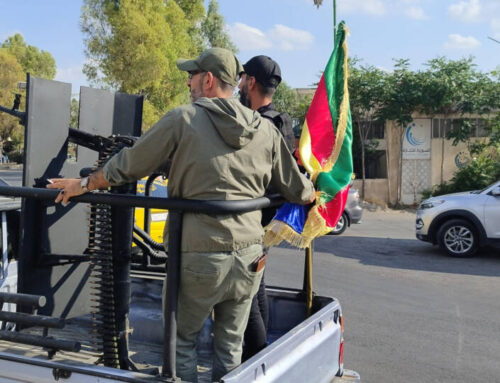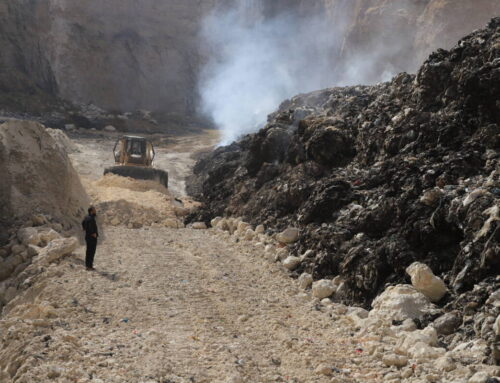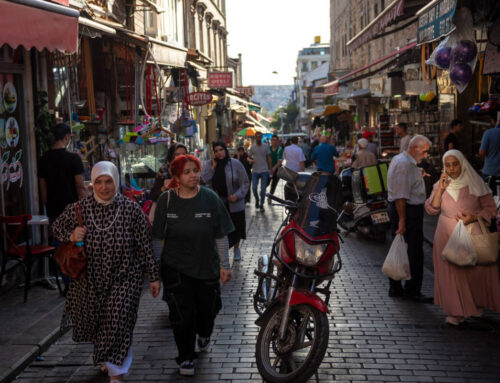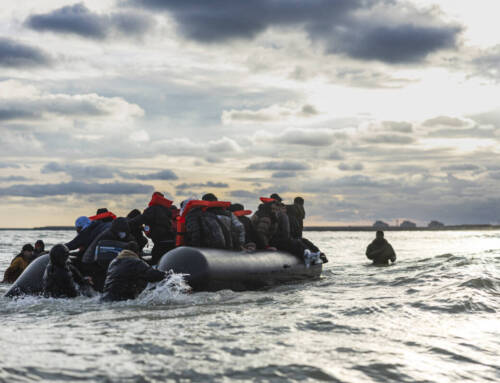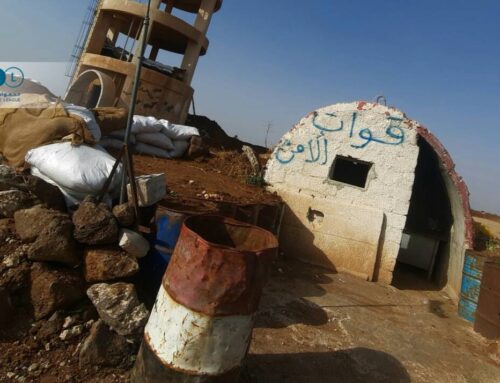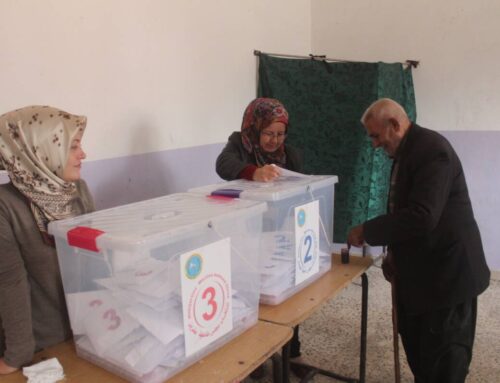‘A long way to go’: Women left out of leadership in northwestern Syria
Women’s participation in institutions governing northwestern Syria is “virtually nonexistent,” even though there are no legal prohibitions on them holding positions in either Salvation Government or Syrian Interim Government bodies.
1 July 2024
IDLIB — “The price was high,” Iman Hashem said, reflecting on her experience as the first woman to be elected head of an opposition local council in Syria six years ago.
When Hashem took office as president of the Local Council of Aleppo City in 2018—then operating in the western Aleppo countryside—one councilmember told his peers on the 140-person body “they should review their Islam, expressing his anger at my arrival,” she recalled.
While Hashem rose to her position with “support and encouragement” from her family and colleagues, it was over “some individuals’ objections,” she told Syria Direct. Some based their opposition to her leadership in religious texts, including a saying attributed to the Prophet Muhammad that “never will succeed such a nation as makes a woman their ruler,” she said.
During her one-year presidency, Hashem ran up against social attitudes based in “the view of women as inferior,” one of “the challenges women face during political participation,” she said.
The greatest danger, however, came in the form of “threats,” including “an explosive device placed in my car, threats to my family and my sister’s kidnapping by an extremist group” that Hashem declined to name. In the end, she was forced to leave Syria when her term ended.
Hashem’s experience, and the risks and challenges she endured, reflect the reality of political life for women in northwestern Syria. The last opposition-held part of the country is run by two separate de facto governments: the Turkish-backed, Syrian National Coalition (SNC)-affiliated Syrian Interim Government (SIG) in northern Aleppo and the Hayat Tahrir al-Sham (HTS)-backed Salvation Government in Idlib province and parts of Aleppo and Latakia.
Women’s participation in the institutions of both governments is “virtually nonexistent,” sources in northwestern Syria told Syria Direct, even though there are no legal provisions barring them from taking part in public life.
HTS areas
From the time the Salvation Government was formed by HTS in November 2017, women’s efforts to secure seats in its ministries or affiliated departments have not succeeded. “Female leadership” is absent from 10 of its ministries, “even though there are women who are capable and willing to lead,” activist Lama al-Eid (a pseudonym) said from her residence in Idlib.
Before HTS monopolized control of Idlib and expelled its opponents in 2017, women held seats in the executive offices of local councils, then affiliated with the opposition SIG, “with a relatively active role,” al-Eid said. Today, women’s presence in government is limited to the Salvation Government’s Women’s Office. Made up of only four women, the office works in a “very stereotypical” way, providing little more than vocational and educational training, she added.
If women participate in independent political bodies or currents—such as the Syrian Future Movement, the Idlib Political Body, the Revolutionaries of 2011 or Revolutionaries of 2015—they make up no more than 10 percent, al-Eid estimated, “and not in an effective or real way,” as if to “fill the gap, no more.” In her view, women are invited to participate in meetings and elections as “a formality, in a way that serves the international image of those entities.”
In HTS-controlled areas in particular, women have faced “unjust exclusion” from decision-making and legislative circles, leading their role in political life to erode from what it was before 2017, al-Eid said.
Syria Direct contacted the Salvation Government regarding the exclusion of women from ministerial and administrative positions, as well as their weak political representation, but received no response by the time of publication.
Al-Eid attributed it to “religious and political” barriers stemming from “a wrong understanding of religion and its relationship with women’s roles,” in addition to “the heritage of patriarchy in society, which does not believe in women’s productive and developmental roles, but limits them to reproduction and nurturing.”
Sawsan al-Tawil, a women’s protection and empowerment activist who works with several organizations—most recently Women Now—attributed the decline to “gender-based violence, which reduces women’s role and presence in bodies and institutions.” This dynamic increases “in the context of conflicts and crises,” as in Syria, she added.
Out of the dozens of organizations operating in Idlib, only two are run by women, Sanaa al-Eis (a pseudonym), a humanitarian activist in the province, said. In the rest, women are limited to administrative positions, and mainly work in medicine and education.
The Salvation Government places “significant restrictions” on some organizations that work to support and empower women in the form of “rejecting, obstructing and blocking necessary permits,” al-Eis added.
On one occasion, al-Eis attempted to obtain a permit from the Salvation Government to hold activities for women and girls in a displacement camp in northern Idlib. To do so, she had to visit several government departments, where staff requested “details and information that violated the team’s privacy, which forced us to back away from carrying out the activities,” she said.
SIG areas
There are no women in the current SIG government led by President Abdurrahman Mustafa, while previous governments included a small degree of representation for women.
Since the SIG’s founding in 2013, three women have held ministerial positions. The first was Taghrid al-Hajli, Minister of Culture and Family Affairs in the first Ahmad Taama government from September 2013 to October 2014. The second was Samah Hadaya, who held the same post in Taama’s second government from October 2014 to May 2016. The third and most recent was Huda al-Absi, Minister of Education in Mustafa’s first government, who began in the position in June 2019 but resigned in mid-April 2021.
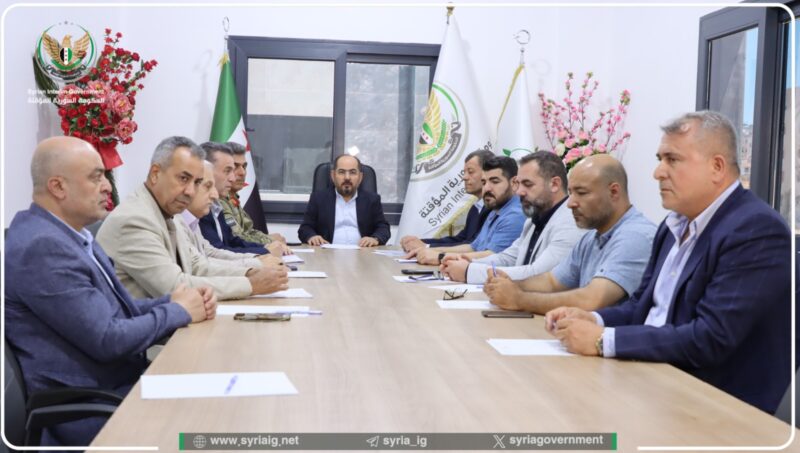
President Abdurrahman Mustafa (center) meets with members of his current all-male government at the opposition Syrian Interim Government’s headquarters in northwestern Syria, 2/6/2024 (Syrian Interim Government)
In a Facebook post after submitting her resignation, al-Absi wrote that she endured “many insults aimed directly at me,” adding “we may have meetings in the near future to clarify all the secrets, difficulties and frustrations we were subjected to during our time at the ministry.”
While women have more representation in SIG institutions than in the Salvation Government, their role remains “limited and marginal,” several sources said. Even on SIG-affiliated local councils, women have a small presence, despite continued calls by Syrian women activists and international bodies to strengthen their role in politics.
According to figures provided to Syria Direct by SIG Minister of Finance and Economy Abdul Hakim al-Masri, the percentage of women working under his ministry has fallen to just 12 out of 450 employees (.026 percent), down from 14 out of 300 (.046 percent) in 2020.
Al-Masri attributed the low percentage of women to “the difficult nature of work” in institutions affiliated with his ministry, such as bakeries and mills. Some female employees have also resigned after finding higher-paid jobs at humanitarian organizations, he added.
Out of the 12 women currently working for the ministry, only one holds a leadership position, working as a manager at the Grain Institution. Another works as an agricultural engineer, while the rest are customs officers at the Immigration and Passports Department. Their role is limited to “entering travelers’ data into the computer and searching women traveling through the crossings,” al-Masri said.
In education, where women occupy a relatively large space as teachers, few are represented in management. This, activist and journalist Kamilia Tamro said, reflects a “male-dominated society that views women’s place as in the home, or limits them to traditional professions such as education and medicine.”
“While some progress has been made in women’s participation in power, challenges remain due to the overlap of political and military authorities, and the long-term influence of the Syrian regime,” Tamro said. She also pointed to “social systems that prefer traditional roles for women and reject their presence in management.”
In a March 2023 study by the Syrian Civil Defense (White Helmets), based on interviews of hundreds of women in northwestern Syria, 45 percent of those surveyed said “society’s lack of acceptance of the idea of women working is one of the most prominent forms of harassment working women suffer from.” Some 32 percent pointed to “feelings of a lack of confidence in working women’s abilities,” which ranked second.
‘A long way to go’
In 2023, around 300 women in northern Syria launched a campaign entitled “We Can Get There,” aimed at reaching decision-making centers in government institutions, particularly the Afrin Local Council. Participants signed a petition with demands including “obtaining a seat on the council, after we selected three candidates to represent us,” Sara Haidar, an activist and the director of women’s empowerment center Release Me, said.
A copy of the petition was sent to the Turkish governor of the area and translated into Kurdish “to allow all the local forces administering the region to hear our call,” Haidar said. Activists were referred to the local council’s Family Affairs Office to discuss their demands, but the campaign “fell on deaf ears.”
Still, Haidar feels the effort was “wonderful,” as “we were very strong in our gathering and unity.”
The women participating in the campaign aimed to strengthen their presence in the local council, where women have “a distinct presence” compared to other opposition councils in northwestern Syria, as Nazla Sheikh Hassan, head of the Family Affairs Office, said.
Sheikh Hassan noted there are “around 50 women in the city council,” including the director of the Self-Government Office and herself.
Women have an active role in Afrin because “the people here respect working women, and have great interest in women’s participation in public life, alongside their interest in education,” Sheikh Hassan said. She stressed that women play an “important and effective” role in the council.
Women’s participation in northwestern Syria’s government institutions is not a favor to seek sympathy for, but a right they should have given their ability to manage institutions alongside men, journalist Fayhaa Shawash said. They are also “more capable of finding out what women’s needs are and how to meet them, and can express women’s voices better than men doing so on their behalf,” she added.
Participation in public life enhances “women’s ability to reach decision-making positions” and in turn “participate in building a sustainable peace, which requires the involvement of all segments of society, including women who make up 50 percent of it,” Shawash said.
“Women’s participation is important in all fields of public life,” human rights activist Huda Sarjawi stressed. “It is a measure of society’s progress and development, or the opposite.” Women should be given the space to “have a voice that allows them to achieve a substantial advancement in integrating women’s issues with all development efforts and public policies,” she told Syria Direct.
But “there is still a long way to go to normalize women’s rights to political representation and active participation in decision-making in northwestern Syria,” activist al-Eid said.
This report was produced as part of Syria Direct’s Sawtna Training Program for women journalists across areas of control in Syria. It was originally published in Arabic and translated into English by Mateo Nelson.

